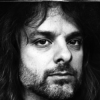David Chalmers

David Chalmers
David John Chalmersis an Australian philosopher and cognitive scientist specializing in the areas of philosophy of mind and philosophy of language. He is Professor of Philosophy and Director of the Centre for Consciousness at the Australian National University. He is also Professor of Philosophy at New York University in the NYU Department of Philosophy. In 2013, he was elected a Fellow of the American Academy of Arts & Sciences...
NationalityAmerican
ProfessionPhilosopher
Date of Birth20 April 1966
CountryUnited States of America
Any sacred text comes alive in a unique way when it is sung, and composers from Gregorian chant to the present day have known that.
I think it's a stupendous piece. I'm frankly a little surprised that it's not done more often because the music is so wonderful. The writing, especially for wind instruments, is extraordinary. He was just very expressive of the text and very inventive. So there's a wonderful sort of genius use of different styles and an ingenious use of the orchestra. I'm excited that we're doing it because I think people need to hear this piece.
They are dedicating a large part of their lives to this choir. Any gift from God is meant to be shared.
Sacred texts are universal and their truths are eternal. There is not a thing that we sing that doesn't have our personal conviction.
Those things in a way didn't need to evolve. They were part of the fundamental furniture of the world all along.
Consciousness poses the most baffling problems in the science of the mind. There is nothing that we know more intimately than conscious experience, but there is nothing that is harder to explain.
How does the water of the brain turn into the wine of consciousness?
A philosopher might find the general work unsophisticated, and scientists are often bemused by esoteric talk of zombies, supervenience, and possible worlds.
It probably helps that my background is in the sciences and I can speak the scientists' language.
Anyway, there is a lot of really interesting work going on in the neuroscience and psychology of consciousness, and I would love to see philosophers become more closely involved with this.
My interests started about in science and in mathematics; I always thought I was going to be a mathematician.
Within psychology and neuroscience, some new and rigorous experimental paradigms for studying consciousness have helped it begin to overcome the stigma that has been attached to the topic for most of this century.
Although I'm Australian, I find myself much more in sympathy with the Austrian version!
Even when I was studying mathematics, physics, and computer science, it always seemed that the problem of consciousness was about the most interesting problem out there for science to come to grips with.